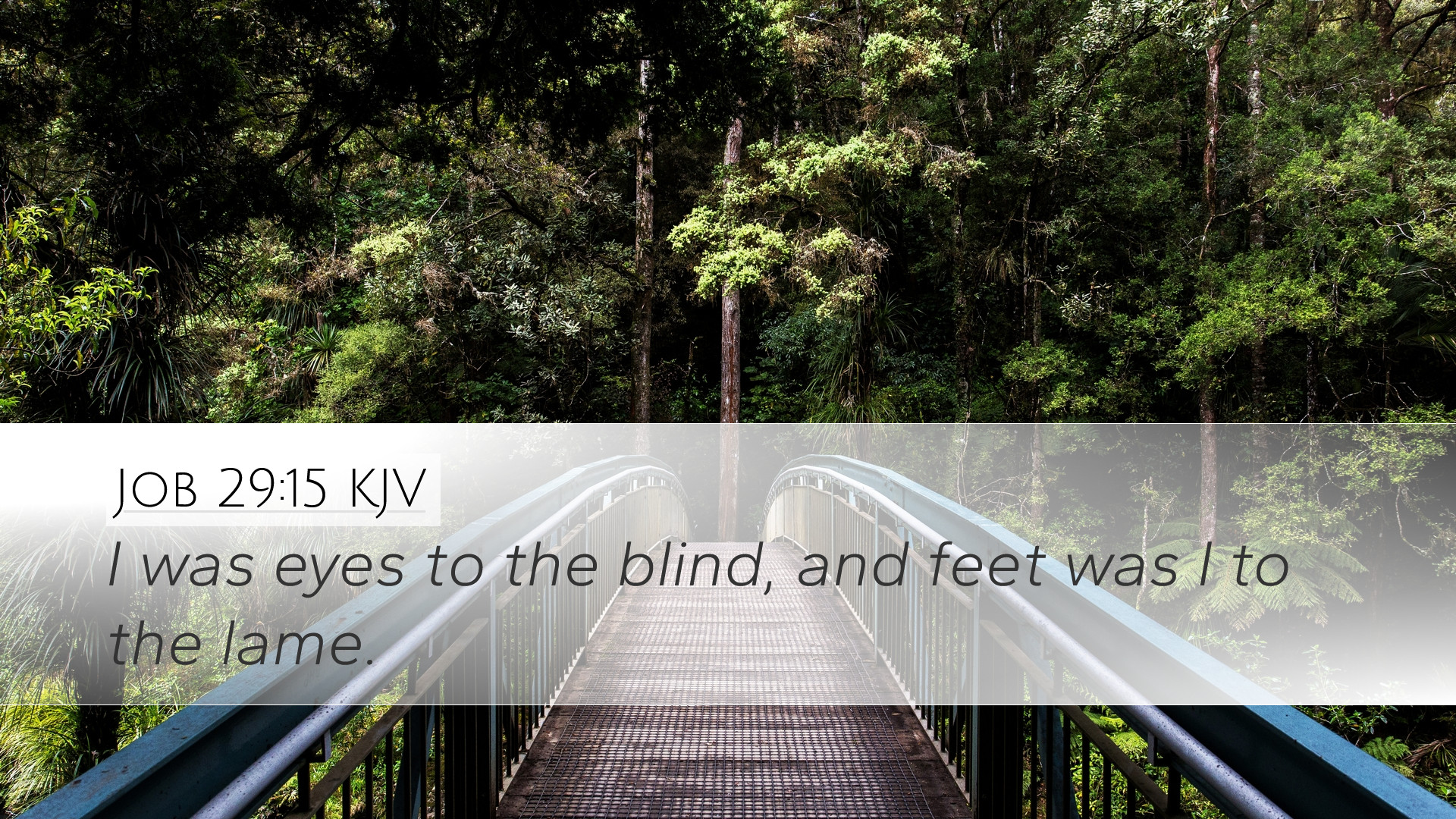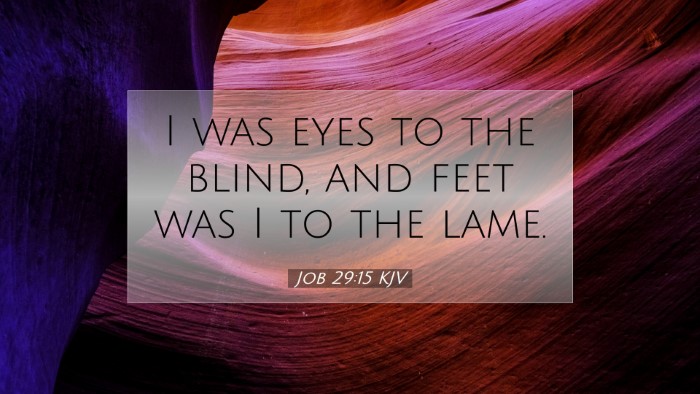Old Testament
Genesis Exodus Leviticus Numbers Deuteronomy Joshua Judges Ruth 1 Samuel 2 Samuel 1 Kings 2 Kings 1 Chronicles 2 Chronicles Ezra Nehemiah Esther Job Psalms Proverbs Ecclesiastes Song of Solomon Isaiah Jeremiah Lamentations Ezekiel Daniel Hosea Joel Amos Obadiah Jonah Micah Nahum Habakkuk Zephaniah Haggai Zechariah MalachiJob 29:15
Job 29:15 KJV
I was eyes to the blind, and feet was I to the lame.
Job 29:15 Bible Commentary
Commentary on Job 29:15
Job 29:15 (ESV): "I was eyes to the blind and feet to the lame."
Introduction
The verse under consideration, Job 29:15, comes from a poignant and reflective passage in the Book of Job, which details Job's understanding of his past righteousness and benevolence. It forms part of a larger discourse where Job recalls his prior status and his acts of charity and justice. This verse particularly highlights Job's role as a benefactor in his community, revealing the deeply ethical and relational core of his character.
Job's Declaration of Past Righteousness
Job's reflection on his past serves a dual purpose: it provides personal vindication amidst his suffering and illustrates a broader theological principle about the nature of righteousness and its practical outworking in society. The phrase "eyes to the blind" signifies Job’s role as a source of guidance and support for those who could not see, representing not just physical assistance but also moral and spiritual enlightenment.
Theological Implications
Theological insights from this verse can be drawn from various public domain commentaries:
-
Matthew Henry:
Henry observes that Job's role was one of compassion; he acted as a guide within his community, providing both physical assistance to the lame and vision to the blind. This allegorically points to the Christ-like role of being a helper to those in need, promoting the notion of active faith that manifests in good works.
-
Albert Barnes:
Barnes emphasizes the profound sense of duty that Job felt towards those who were vulnerable and marginalized. His assertion serves as a reminder to all believers of the importance of carrying out acts of kindness and support for the less fortunate. It also highlights the social responsibility that comes with righteousness.
-
Adam Clarke:
Clarke’s commentary brings forth the idea that Job’s life epitomized the principles of justice, mercy, and compassion. He suggests that the metaphor of 'eyes' and 'feet' symbolizes Job's engagement in social justice, reinforcing the biblical theme that true devotion to God necessitates care for the oppressed.
Job's Empathy and Advocacy
This verse underlines Job’s empathy toward the suffering and underscores his role as an advocate for the downtrodden. By describing himself metaphorically as 'eyes to the blind,' Job portrays an image of someone who provides illumination amidst darkness. It reflects the responsibilities taken upon by a righteous individual to uplift those who cannot help themselves.
Lessons for Today
For contemporary pastors, theologians, and students of the Bible, Job 29:15 presents the following important lessons:
-
The Call to Compassion:
In the same way that Job served the blind and the lame, believers are called to show compassion in practical ways towards the marginalized—an essential aspect of living out one's faith.
-
The Role of the Righteous:
Job's reflections challenge modern believers to be proactive in their communities, mirroring the work of Jesus who was a healer and advocate. This call also includes bringing righteous indignation against social injustices.
-
Understanding Suffering and Advocacy:
Job’s advocacy for those in need can remind Christians that suffering is often accompanied by a higher calling. In moments of personal hardship, one’s past actions can serve as a reminder of God’s faithfulness and the importance of maintaining a life of service.
Conclusion
Job 29:15 encapsulates a profound message about the nature of righteousness and the imperative of acting justly and compassionate in community. The insights provided by various commentators enrich the understanding of this verse and serve to inspire believers toward a life characterized by service, empathy, and advocacy for the marginalized. As we reflect upon Job's words, may we find renewed purpose in serving others, drawing from the depths of our faith to act as 'eyes' and 'feet' for those who are in need.


